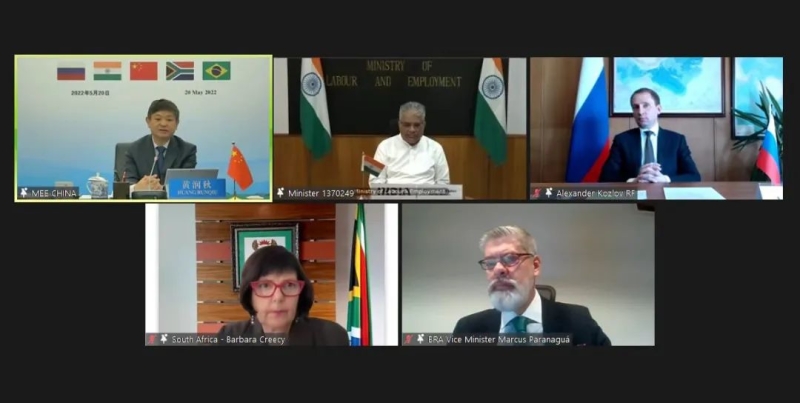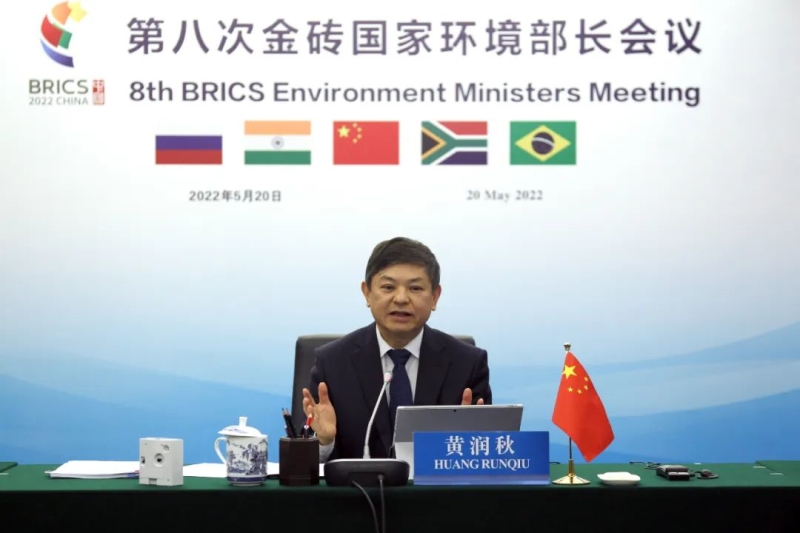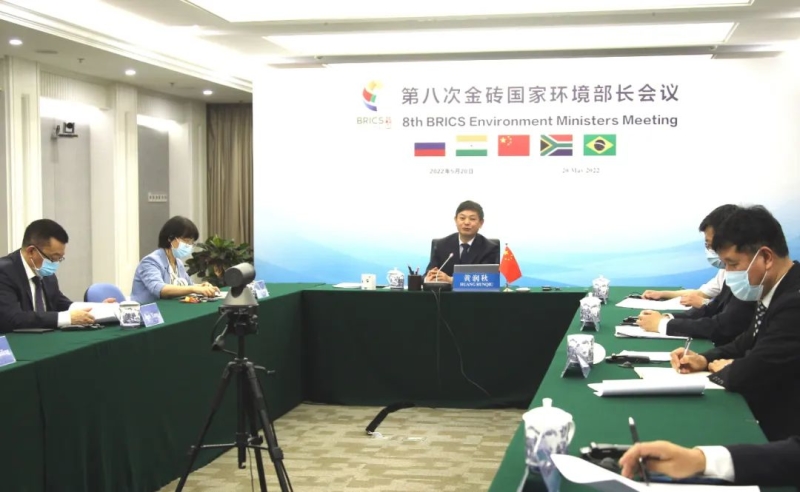The 8th BRICS Environment Ministers Meeting Held

On 20 May 2022, as the BRICS presidency, China successfully hosted the 8th BRICS Environment Ministers Meeting online with the theme of “Join Hands to Facilitate Green and Low-carbon Development”. Mr. Huang Runqiu, Minister of Ecology and Environment of China, presided over the meeting and delivered an opening speech and a keynote address. Environment ministers from all other BRICS countries attended the meeting and delivered remarks including Ms. Barbara Creecy, Minister of Forestry, Fisheries and the Environment of South Africa, Mr. Marcus Paranaguá, Secretary of Climate and International Relations of Brazil, Mr. Alexander Kozlov, Minister of Natural Resources and Environment of Russian, and Mr. Bhupender Yadav, Minister of Environment, Forest and Climate Change of India.

Huang Runqiu recalled the progress made since the first BRICS Environment Ministers Meeting held in 2015, which has become an important platform for BRICS countries to jointly seek solutions to improve environmental governance and tackle global environmental challenges. BRICS environmental cooperation has become a significant and integral part of the international process of advancing global ecological and environmental protection. Adhering to the guiding principles of the leaders’ summits, BRICS environmental authorities have always been deepening practical cooperation by enhancing mutual learning, exchanges and dialogues.
Huang Runqiu remarked that the world is now undergoing momentous changes compounded by a pandemic unseen in a century, and new risks and challenges have emerged in the implementation of the 2030 Agenda for Sustainable Development.There is a need to address the global challenges of climate change and environment, and a consensus of the international community to work together to promote green and low-carbon development as well. In the new circumstances, BRICS countries should act closely to deepen environmental cooperation with prominent BRICS features and inject new impetus for green and low-carbon development worldwide. Concerted efforts should also be made to contribute to the attainment of the 2030 Sustainable Development Goals, and building a community with a shared future for mankind, as well as a clean and beautiful world.
Huang Runqiu noted that under the guidance of Xi Jinping Thought on ecological civilization, the Chinese government is committed to green and low-carbon development and vigorously advances comprehensive green transition of economic and social development, which generates fruitful results. As the biggest developing country, China has pledged to achieve carbon neutrality after peaking its carbon emissions within 30 years, the shortest period of time across the globe, while firmly pushing forward the industry and energy transition in a green and low-carbon manner. The Chinese government raises its ecology and environment quality by carrying out effective campaigns on pollution prevention and control. With strict supervision on ecosystem conservation and restoration, the natural ecosystem has been constantly improved. Plans of response measures have been developed to strengthen control of new pollutants which have gradually emerged in recent years. China has also been deeply involved in global environmental governance to realize stronger, greener and healthier global development.
Huang Runqiu pointed out that with great potential for environmental cooperation, BRICS countries should further strengthen dialogue and communication to find a new path towards harmonious coexistence between man and nature, foster high-quality partnership and create a bright future for global development. China advocates practicing multilateralism and enhancing coordination on responding to climate change and conserving biodiversity. Practical cooperation should be facilitated to build multi-level and multi-disciplinary cooperation models in areas such as implementing the Partnership for Urban Environmental Sustainability Initiative and carrying out environmental technology exchange. BRICS countries should take the lead in green and low-carbon technological innovation, and, by further sharing green technologies and promoting their application, contribute environmental solutions to developing countries and the world at large.
Delegates from BRICS countries exchanged in-depth views and reached broad consensus on topics including accelerating the green and low-carbon transition, achieving the 2030 Sustainable Development Goals, and continuously strengthening cooperation on environment.

The meeting reviewed and endorsed the Joint Statement for the Eighth BRICS Environment Ministers Meeting. The Statement highlights the significance of accelerating the implementation of the 2030 Agenda for Sustainable Development, and demonstrates the agreement and vision of BRICS countries in boosting green, low-carbon and sustainable development. It also urges BRICS countries to step up policy dialogue and joint research, and carry out closer cooperation in the areas of tackling climate change, biodiversity conservation and marine environmental protection.
Delegates from relevant departments of Ministry of Foreign Affairs and Ministry of Ecology and Environment of China attended the meeting.
(Ministry of Ecology and Environment of People's Republic of China)